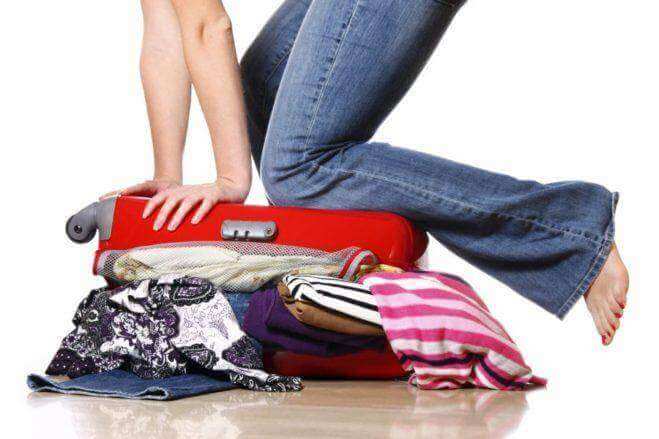
Minimalism for Digital Nomads and Travelers
Minimalism in its mainstream definition usually means to purchase and consume only what you need. For travelers, the main focus will change to only carry what you need. The basic idea is that if you don’t need it, don’t take it with you. In my opinion, minimalism is important for everyone, but becomes essential for long-term travelers and digital nomads. In this article, we will discuss a few minimalist concepts for long-term travelers. We’ll also touch on the benefits it offers, mainly focusing on carrying less with you. In addition, we’ll introduce some other general related minimalist mindsets and actions which are beneficial for people who are constantly on the road.
If you’re not traveling, the downside of non-minimalism is paying and stocking up on things you don’t need. But you may have a storage room, or an extra closet, where you can put those things away. For travelers the downside is much bigger since what they carry is on their backs a daily basis. This is why minimalism comes naturally for them. You will become more minimalist by inertia and the pain it will cause you to carry many things. That’s why it might be recommended for people who face a problem with over-consumption to travel for an extended period of time. They’ll become minimalists by learning the hard way.
The difference between comfort and necessity
Before we continue with our ideological assault in pro of minimalism, it’s worthwhile to say that extreme minimalism is also not recommended. Extreme minimalism means either having too little of what you need or opting to buy the cheapest items there are, regardless of their quality. The following phrase in Spanish sums it up- “Lo barato sale caro” (What is cheap turns out to be expensive). The best minimalism version I know of is to own a few essential items, of great quality. Extreme minimalism is not only about buying the cheapest items, but also about owning too few items. Slow travel which is the art of switching locations every few weeks will also allow you the balance of carrying just enough, instead of opting for as little as humanly possible if you switch locations on a daily basis. For example, when you slow travel, it’s okay to have a suitcase (which is hopefully small), but two suitcases will make your transitions a mess. On the other hand, carrying just one backpack with you doesn’t make much sense for slow travelers, because it can hardly contain anything.
To discuss minimalism, it’s also important to distinguish between comfort and necessity. Over consumption is in a way, an addiction to comfort in order to reduce friction and make your life easier. You can’t really travel happily if you’re used to being comfortable since friction will keep on appearing. Friction is an adventure, and it’s also where you grow as a person. Confusing necessity with comfort will make minimalism impossible and traveling less fun. Comfort is a tricky concept though since it changes from one person to the other, and the definition will also change over your lifetime. For example, staying in single rooms and avoiding dorms was once considered comfort, but has now become a necessity for me, since I work and need good sleep.
It is also important to separate between what you need and your ego. Ego is our fake radar which is obsessed with how successful and happy we are, and how we’re perceived by others. Ego will often be the cause of purchasing flashy items we don’t really need. Signalling that you’re successful is a good thing, especially since the first impression when traveling is important to get friends and validate yourself. However, too much of it results in more damage than good. If you want to be a minimalist, it is better to take your ego for a quick walk and tell it to shut up.
Becoming a minimalist can be difficult. Research actually shows that the pain of losing something is a lot stronger than the joy of receiving the equivalent. Try comparing the excruciating pain of getting a 5% pay-cut to the small joy of receiving a 5% increase to your salary. In relation to minimalism – the more you have, the harder it is to let go, regardless of how much it’s really necessary. Better just not to put yourself through this test.
Now that we have some concepts in place, let’s switch to the benefits of carrying less with you as a long-term traveler or a digital nomad.
Benefits of carrying less
Financial Freedom. When you consume less, you have less, and you won’t need to make as much money. This gives you the freedom to work less and use your time for other things.
Increased security. Carrying many things makes you slow and vulnerable as you move between places. You become an easy and apparent target. It will also be easier to forget and lose things the more stuff you have.
Physical comfort. It’s much more comfortable and fun to travel light, and your back will also thank you. Being clumsy with gigantic bags while moving between locations is not a fun experience.
Blend with the locals. You can assimilate faster if you’re not carrying big suitcases around and look like a tourist. If you have a small suitcase, you’ll look like a local on a weekend vacation, while impressing and sometimes shocking people around you when they see how little you carry.
Saves your time and money. You can check out super fast on each move, without wasting valuable time on packing. Also, the limited selection of items allows you to spend less time on making decisions – like what to wear every day. In addition to time, you will also save money on maintaining and replacing your unnecessary items, storage, and checking in extra luggage in your flights.
Flexibility. You can change locations and plans in a heartbeat when you’re not burdened by luggage. Things create attachments and make you heavy; the more you have the more you have to maintain and the more flexibility is lost.
No worries. The more you have, the more you have to lose. Having too many valuables with you makes the cost of losing them incredibly high. You will miss out on great opportunities such as going swimming and leaving your stuff behind due to constantly thinking about the worst case scenario. You will be happier and more relaxed carrying less. Minimalism also assures that if you lose what you have, it will be painful, but easily and promptly replaceable. Do not carry valuables you don’t need with you!
Last but not least. Minimalism will also teach you something amazing. You don’t need to carry around your entire home to feel at home. Home is where you are.
Minimalism in life as a traveler
Being a minimalist is not only about what you carry, but also about your actions and habits.
A minimalist attitude will provide you with better health, as you will also eat less and focus on basic food such as vegetables, rice and so on. Basic food is the healthiest, cheapest and most commonly available as you travel between locations.
A minimalist will also go on an information diet and avoid low quality news and social media feeds. You’ll get more time to focus on what matters and also educate yourself as you travel with an open mind other than consuming information written by someone with interests. Everyone has interests, keep to yours. Form your own opinions instead of copy pasting from someone else.
A minimalist long-term traveler will also have fewer routines but the ones they have will be more valuable. A minimalist will only commit to activities that are easy to do anywhere and don’t require special conditions or locations. For example, a walking routine in the morning that can be done anywhere, and so can exercising in a public park. Keep it simple.
In conclusion, the benefits of minimalist living are valuable for long-term travelers, it makes life simpler and helps you focus on what is most important which is everything you didn’t buy in a store. Give it a try.



0 Comments